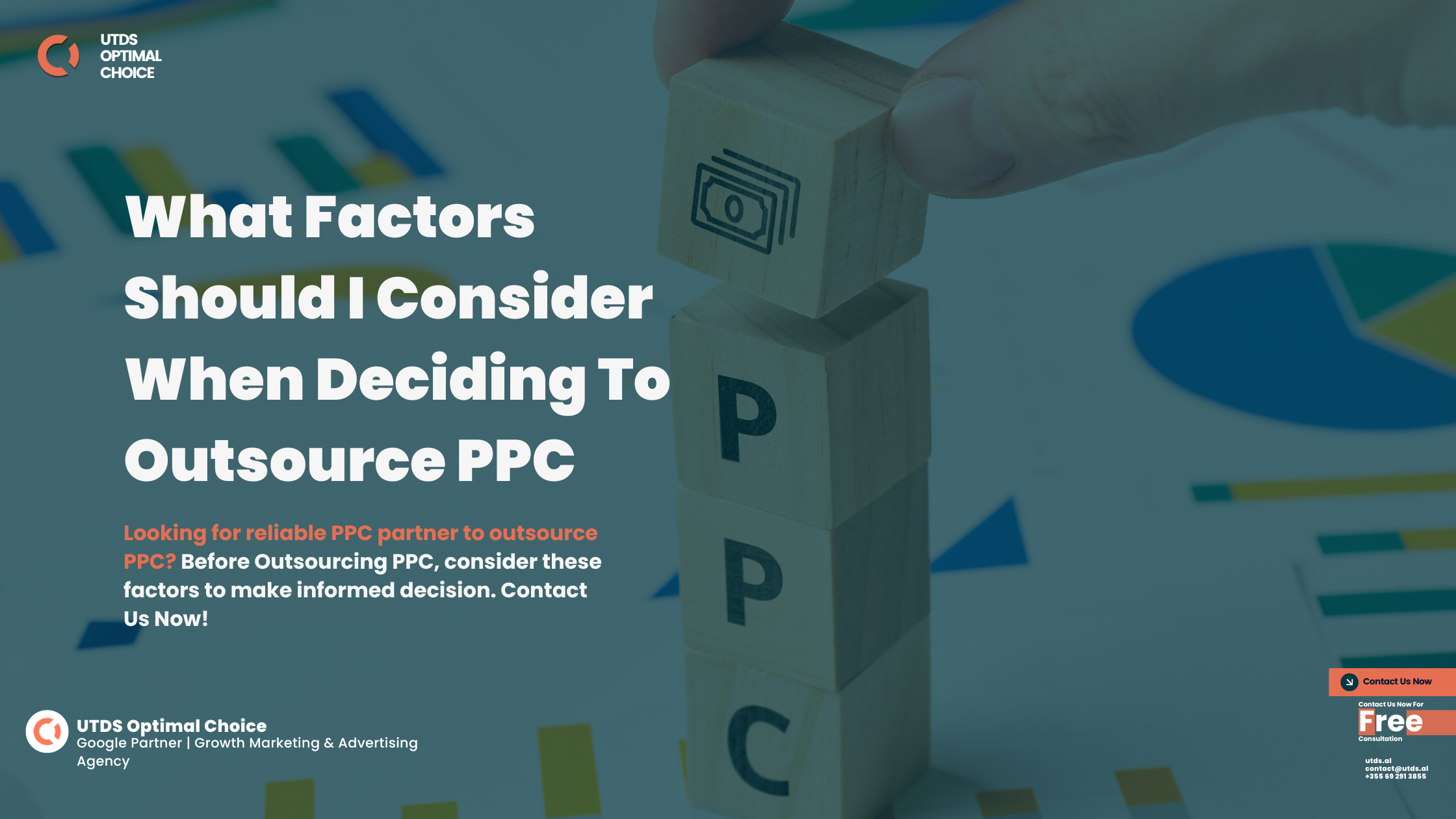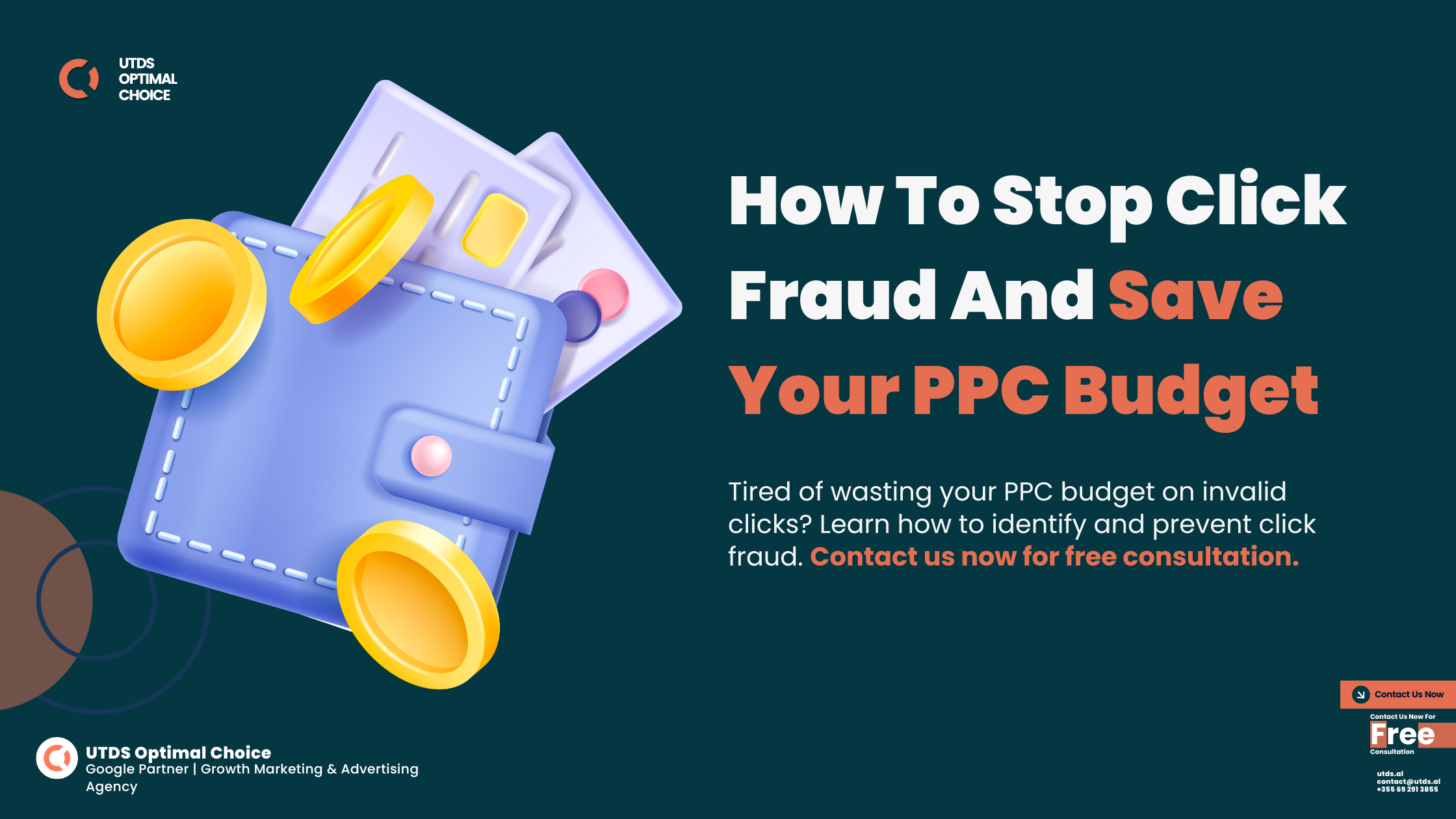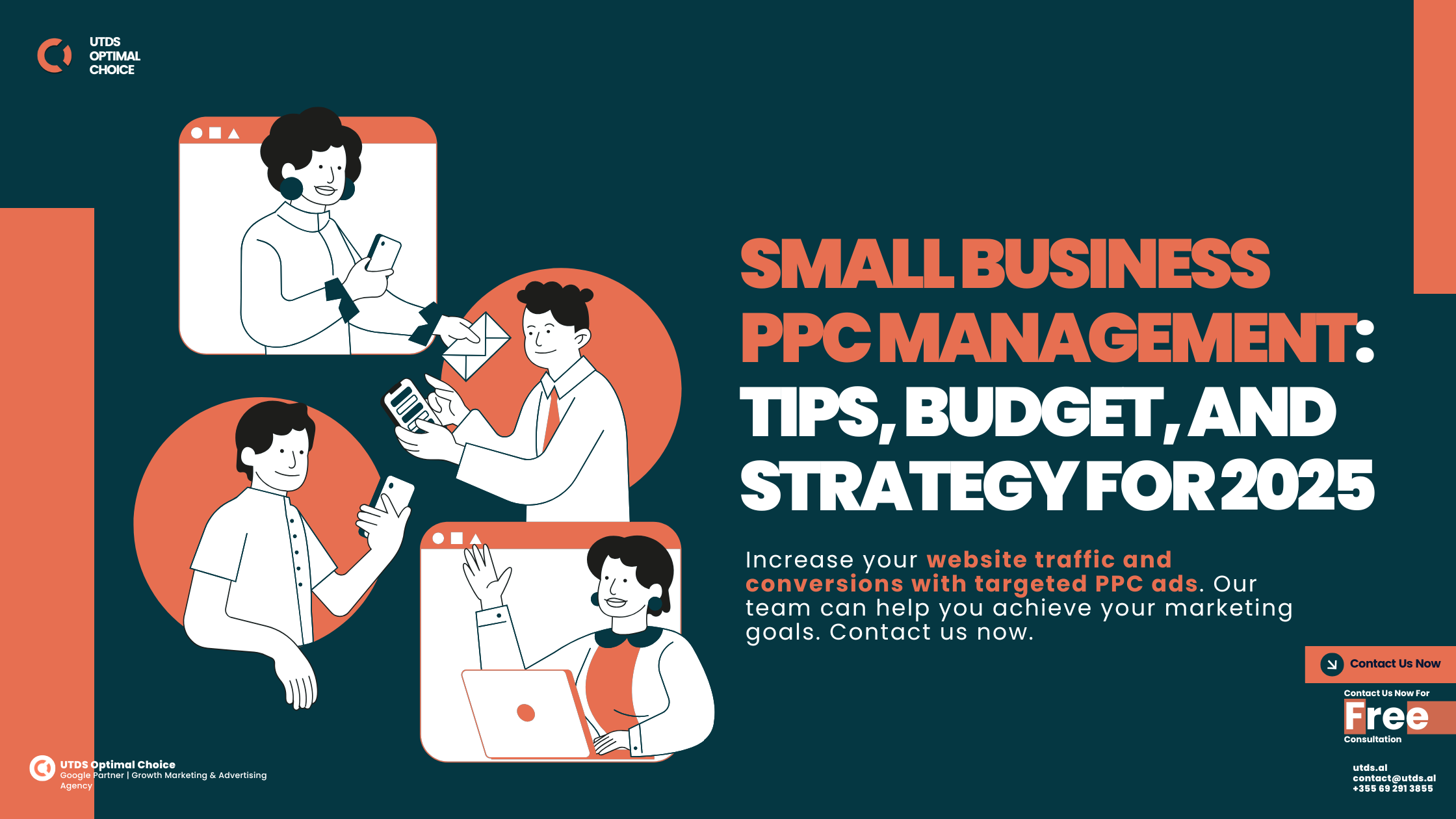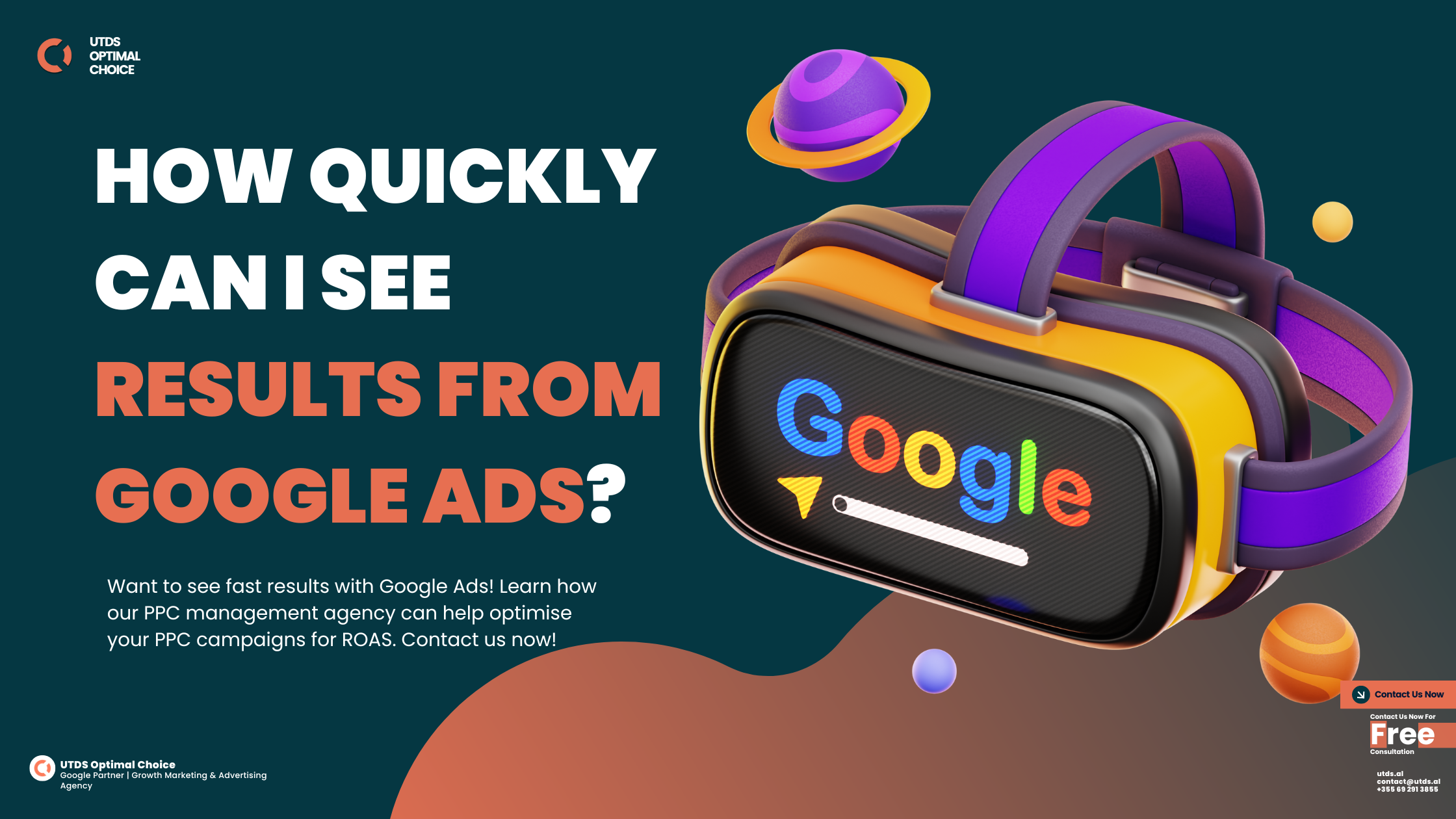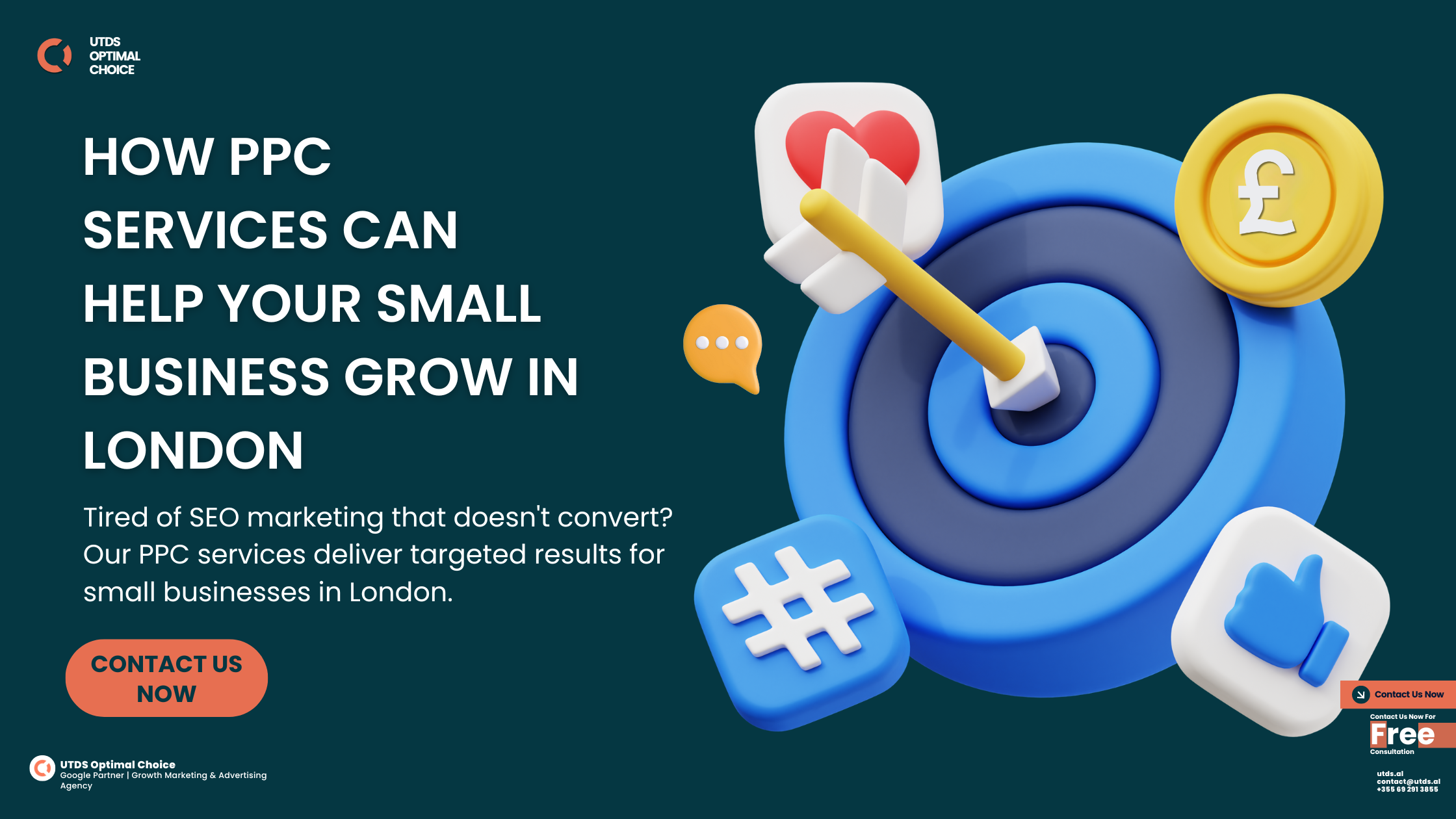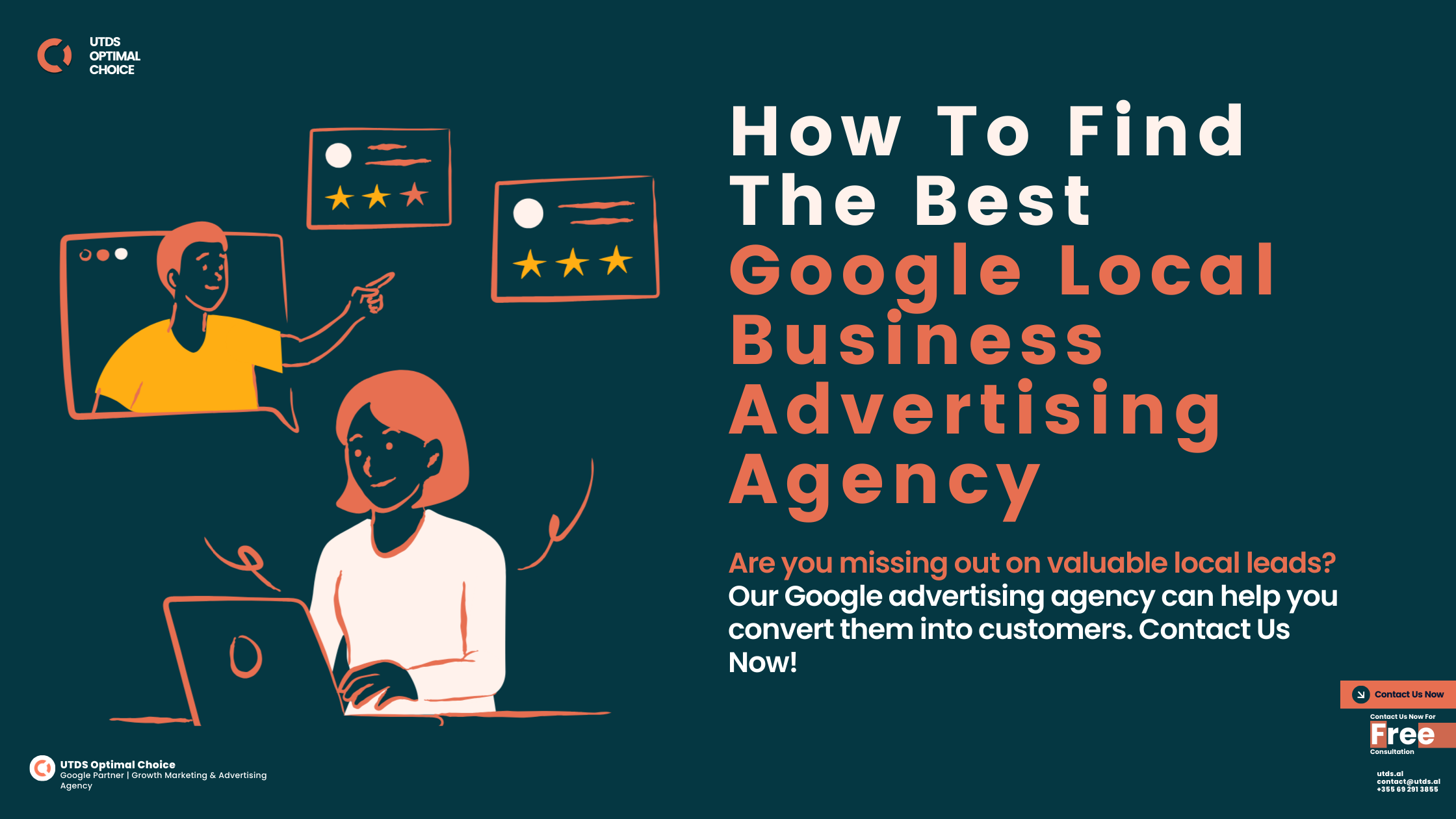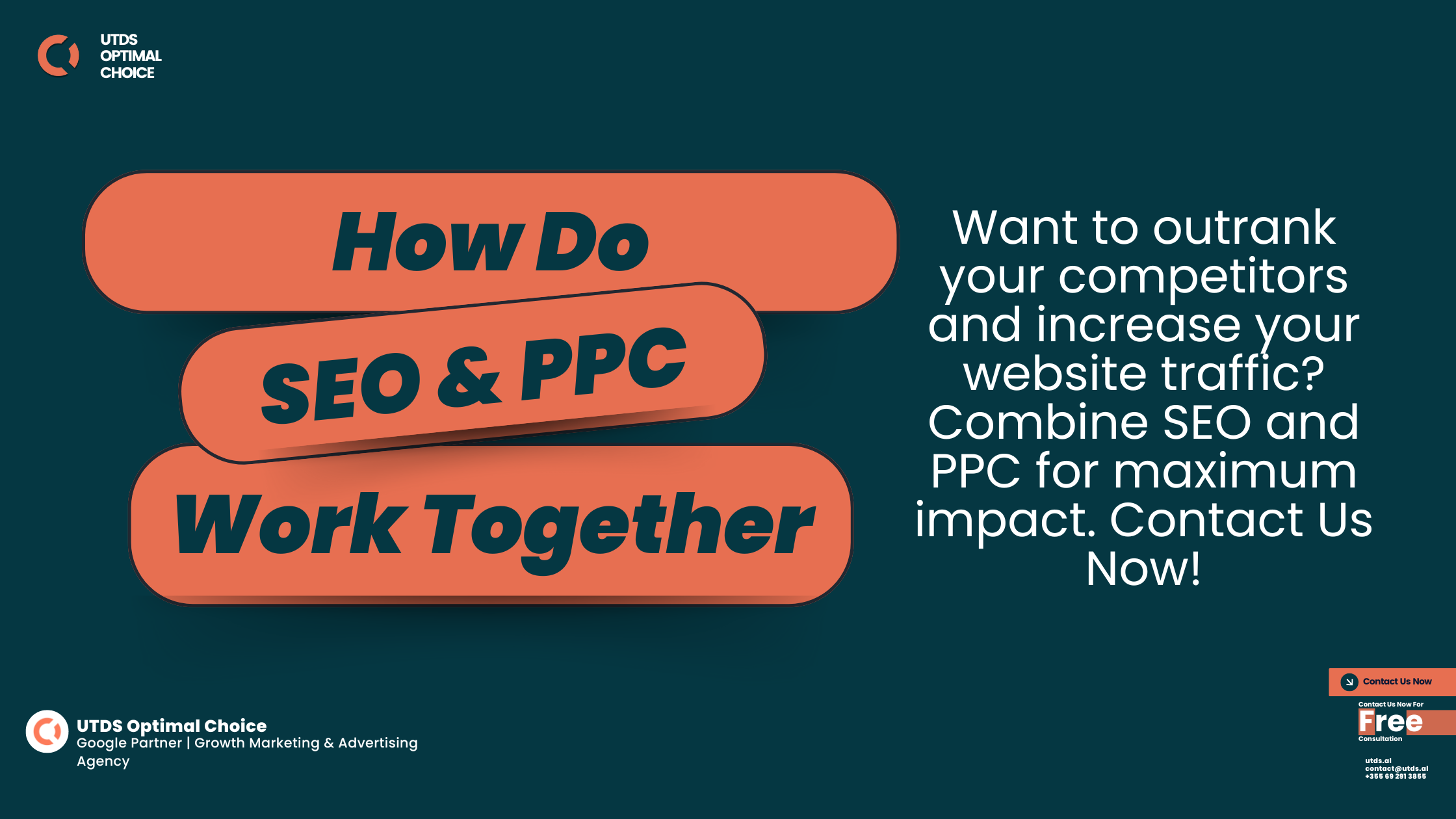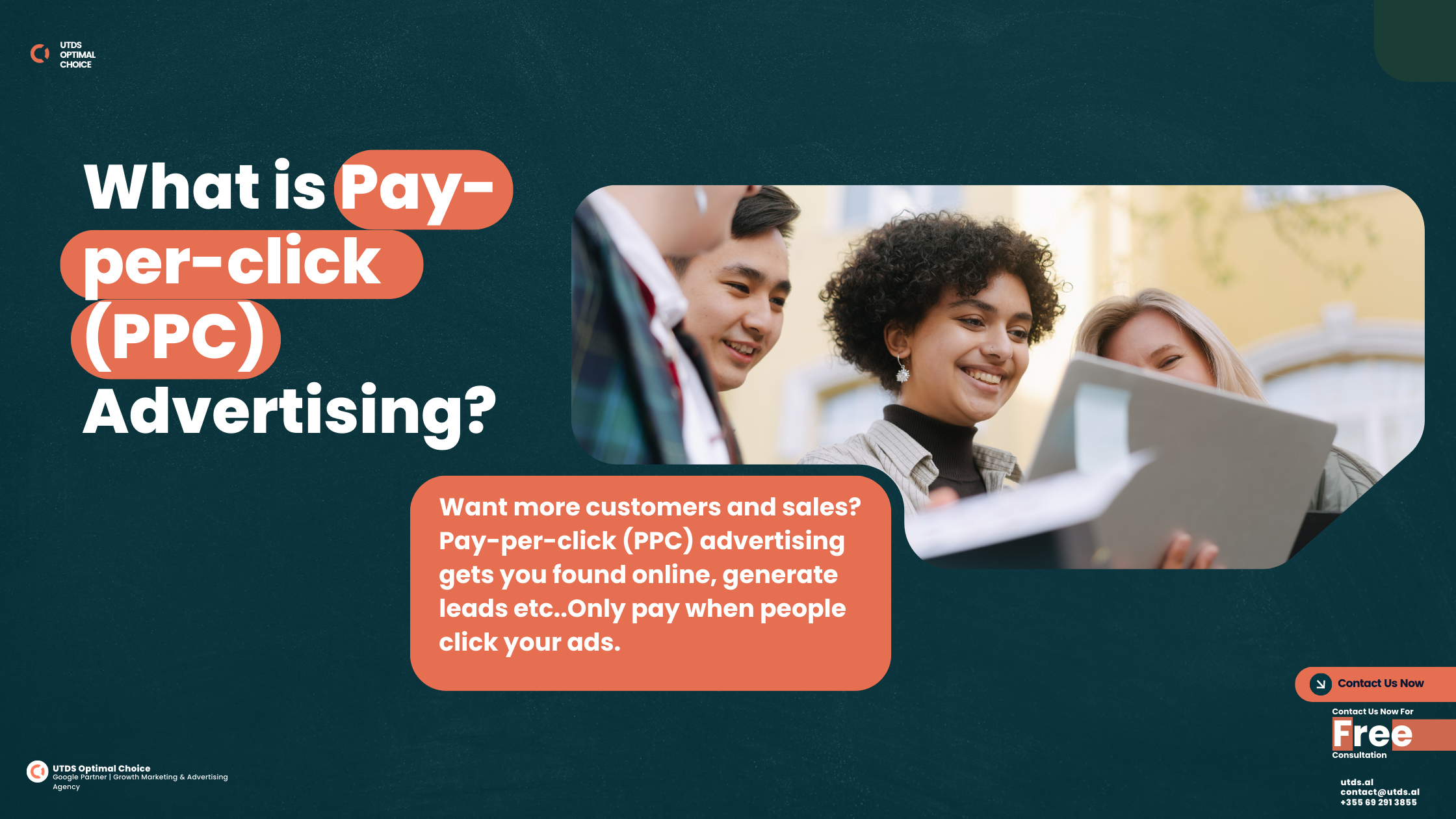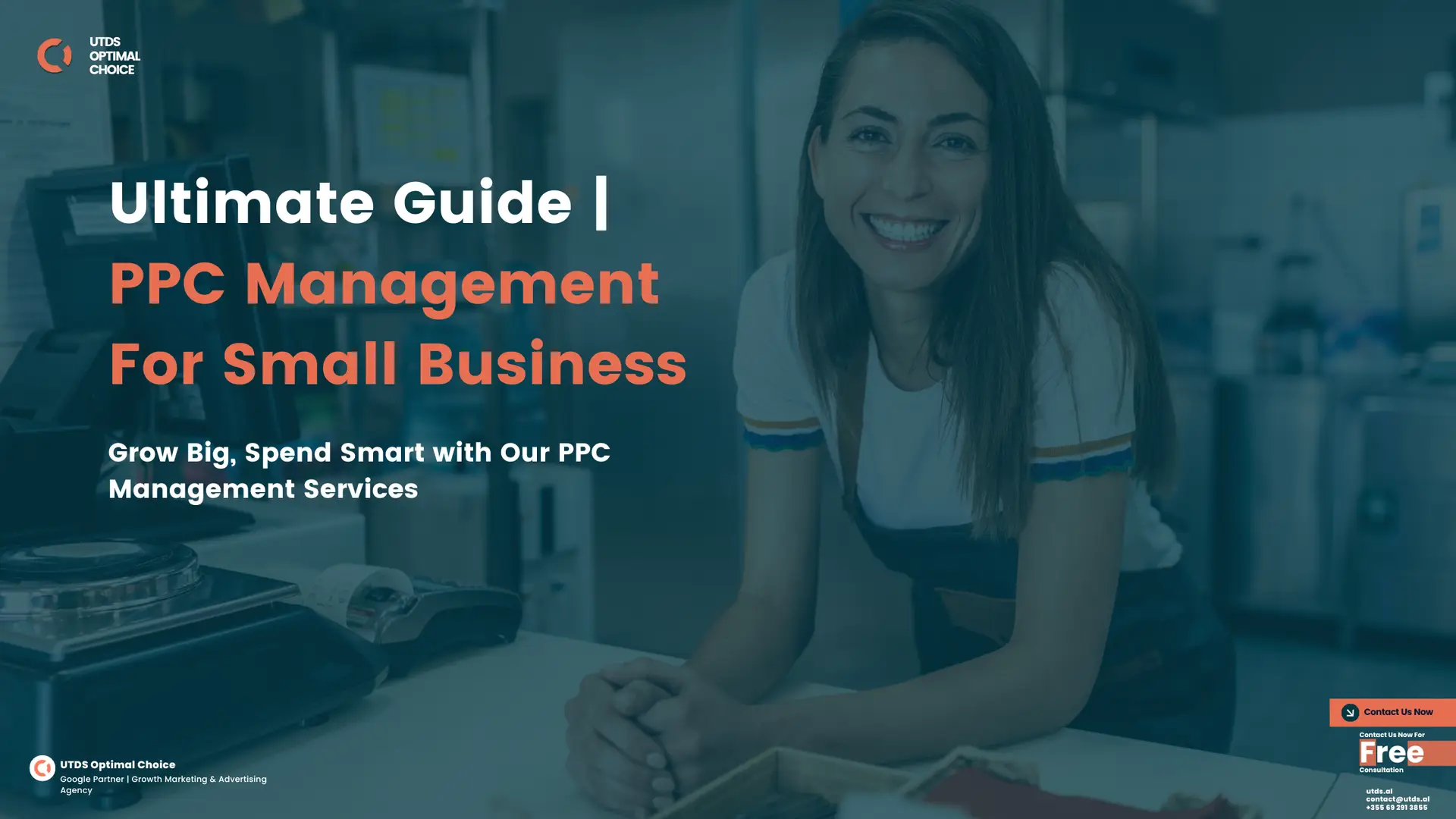How much does Google Adwords cost in 2025? For most UK businesses exploring paid advertising on Google, it’s the first question that comes up and one that doesn’t have a simple answer. Google Ads cost is not fixed. Instead, it varies based on your industry, competition, targeting strategy, and how well your account is set up.
Recent Benchmark report from WordStream suggests the average cost per click (CPC) in Google Ads for the UK ranges between £0.66 and £1.32, depending on sector and campaign type. However, that’s just the starting point. Businesses across the UK are paying anything from £5 to over £50 per click depending on how competitive the keyword is.
In this article, we’ll break down the key factors that influence Google AdWords pricing in 2025,
- how to calculate your average CPC, and
- how you can reduce your Google PPC costs while still reaching the right audience.
Whether you’re a small business trying out Google Ads UK for the first time or looking to scale a nationwide PPC campaign, this guide explains what affects your ad spend and how to get the best value from it.
Want expert help in managing your Google PPC costs and maximising your ad budget? At UTDS Optimal Choice, we specialise in creating cost-effective PPC strategies tailored to your business needs. Contact us today to discover how we can help you reduce costs and increase conversions with Google Ads.
Factors That Impact Google Ads Pricing
There’s no flat rate when it comes to Google AdWords cost. Instead, several variables influence what you pay per click and how far your ppc budget stretches. Understanding these can help you reduce waste and improve ROI across your paid advertising on Google.
1. Your Industry
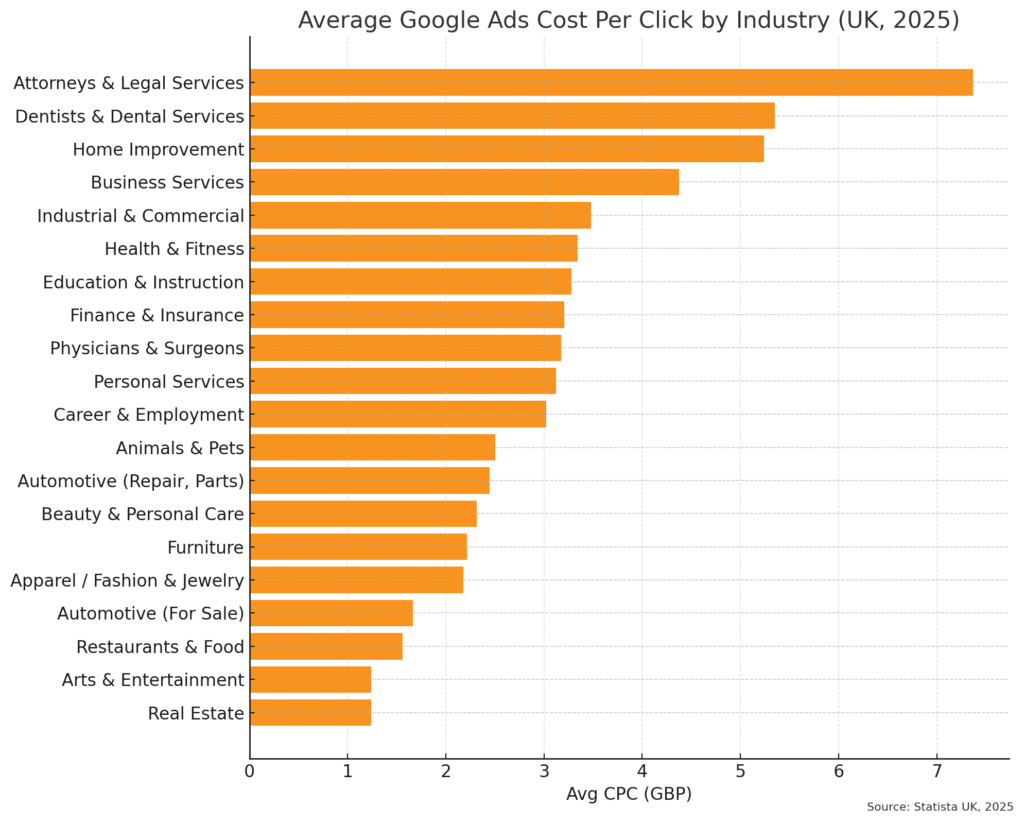
Some sectors pay significantly more per click than others. For example, in 2025:
- The legal sector averages over £5.60 per click
- Finance and insurance campaigns range from £3.80 to £6.20
- E-commerce and retail sectors average £0.66 to £1.40, depending on product competitiveness
Why the difference? Because Google Ads pricing follows a demand based model, industries with high customer lifetime value and stiff competition drive CPCs higher.
Check this recent breakdown from Statista UK – CPC by industry.
2. Search Advertising Benchmarks In 2025
According to Search Engine Journal, average click-through rates (CTR) for UK search ads in 2025 range from 3.1% (legal) to 6.4% (automotive). High CTRs can lower your Google PPC cost by improving Quality Score, which we’ll explain in a moment.
High-performing ads in 2025 focus on location relevance, ad extensions, and tight keyword match types to compete.
3. Customer Lifecycle
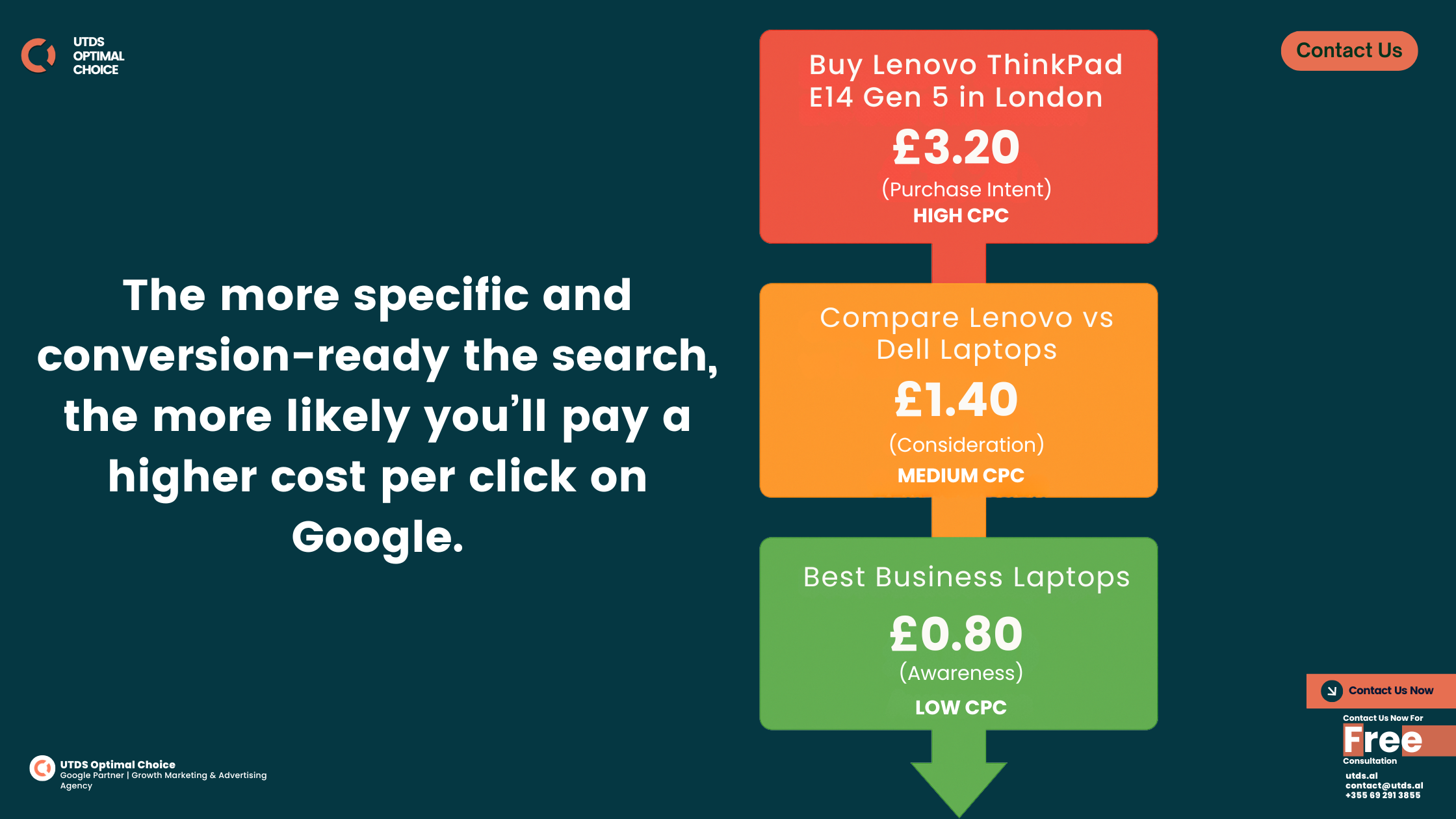
When your customer sees your ad and where they are in their buying journey, can affect your campaign costs. For example:
- Top-of-funnel keywords like “best business laptops” tend to be cheaper
- Bottom-of-funnel searches like “buy Lenovo ThinkPad E14 Gen 5 in London” cost more due to higher purchase intent
The more specific and conversion ready the search, the more likely you’ll pay a higher cost per click on Google.
4. Key Trends Shaping Google Adwords Cost 2025
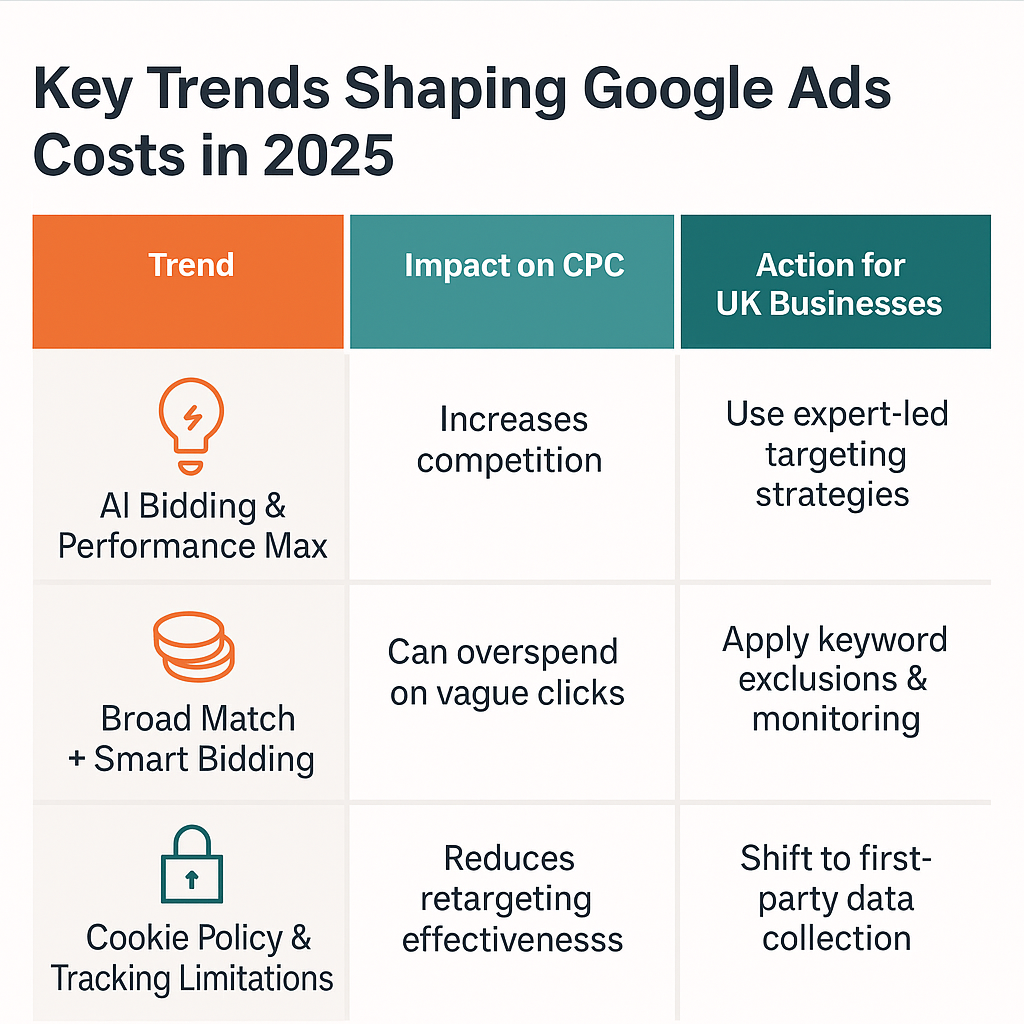
Google Ads costs are also shaped by broader trends:
- AI bidding and Performance Max campaigns are now standard, increasing competition
- More UK advertisers are using broad match with smart bidding, which can drive up PPC spend if not carefully monitored
- Changes in cookie policies and tracking limitations are making advertisers rely more on first-party data, shifting targeting strategies
UK businesses working with a skilled Google AdWords agency are finding ways to optimise around these trends and lower their Google PPC fees effectively.
How Well You Manage Your Account
You could have the best product in your industry, but if your Google Ads account isn’t managed correctly, you’ll waste money. In fact, poor account structure is one of the most common reasons why Google AdWords costs spiral out of control in the UK.
Here’s how management affects your spend:
1. Campaign Structure
If your campaigns aren’t segmented properly by product, service, or search intent, Google will struggle to deliver relevant ads, which raises your cost per click.
Poor structure = low relevance = low Quality Score = higher Google Ads cost.
2. Keyword Targeting
Many small businesses target broad, generic terms like “digital marketing” or “plumber” which are expensive and competitive. Instead, targeting long tail keywords like “Google Ads PPC agency in Sheffield” brings down Google PPC rates and improves conversions.
3. Negative Keywords
Regularly updating your negative keyword list ensures your ad doesn’t show up for irrelevant searches. For example, a private dentist in Leeds shouldn’t pay for traffic from “free NHS dentist appointment”.
Ignoring this can quietly drain your daily budget.
4. A/B Testing and Optimisation
Consistent testing of headlines, ad copy, and CTAs can dramatically improve your Quality Score, reduce bounce rates, and lower your Google Ads pricing.
As reported in WordStream’s Google Ads benchmarks, ads with a Quality Score of 8 –10 can reduce CPCs by up to 50% compared to lower scores.
5. Use of Ad Extensions
Ad extensions, like callouts, site links, location, and structured snippets, improve ad visibility and performance. They’re free to add, but if you don’t use them, your ad appears smaller, less clickable, and less relevant.
In 2025, the top-performing UK advertisers include at least 3 extensions per ad group, based on analysis from Search Engine Land and Wordstream.
How Does Google Ads Determine Your Cost Per Click?
Google Ads cost is determined through an ad auction system that happens in real-time every time a search is performed. But unlike a traditional auction, the highest bidder doesn’t always win. Instead, Google considers two key elements:
- Quality Score and
- Ad Rank.
Let’s break that down.
Quality Score
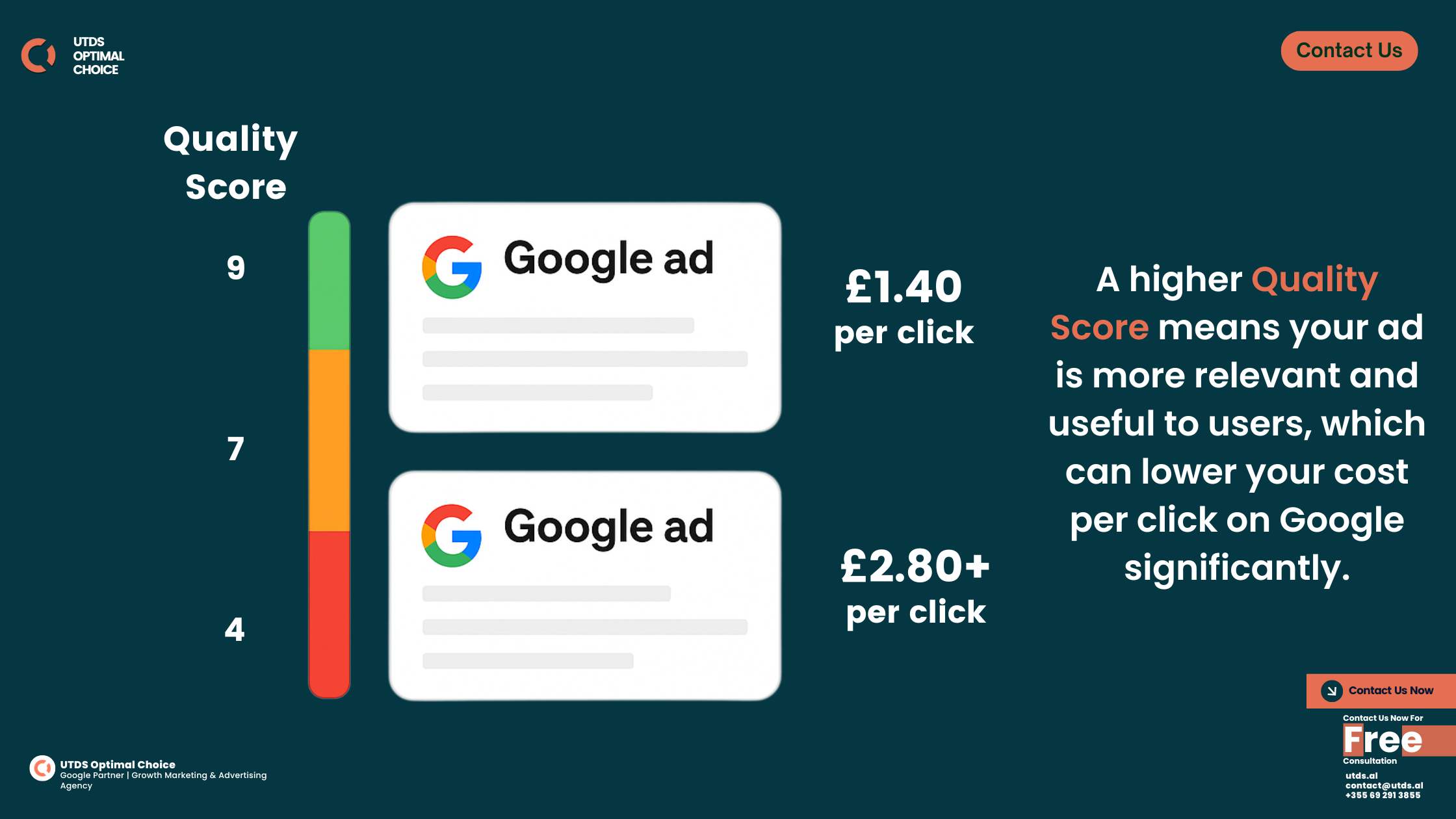
Quality Score is a 1–10 rating Google assigns to each of your keywords. It’s based on:
- Expected click-through rate (CTR)
- Ad relevance
- Landing page experience
A higher Quality Score means your ad is more relevant and useful to users, which can lower your cost per click on Google significantly.
Example: A Google ad with a Quality Score of 9 may pay £1.40 per click, while a lower-scoring ad for the same keyword could pay £2.80+.
Ad Rank
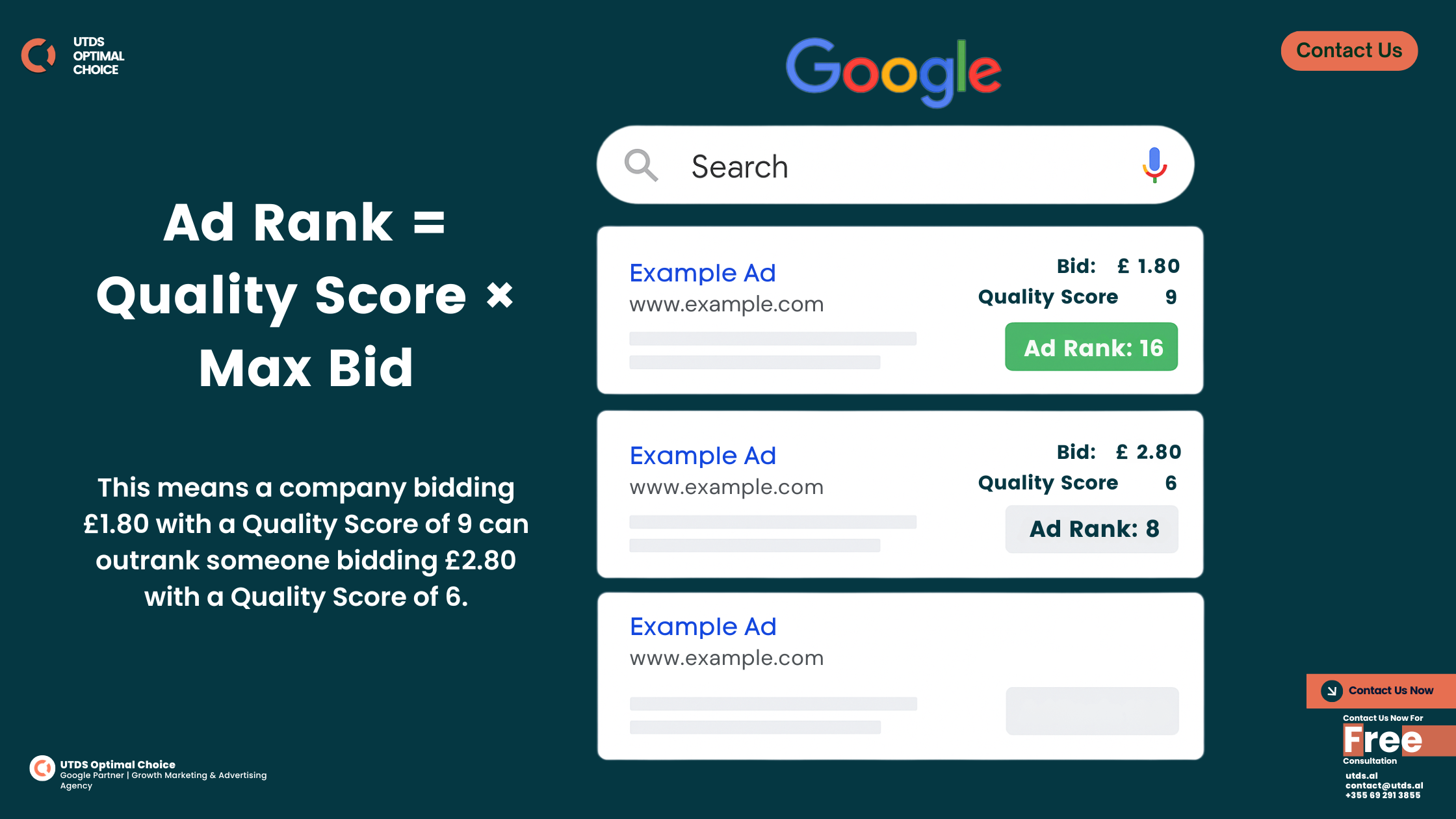
Ad Rank determines your ad’s position on the search results page. It’s calculated as:
Ad Rank = Quality Score × Max Bid
This means a company bidding £1.80 with a Quality Score of 9 can outrank someone bidding £2.60 with a Quality Score of 5.
According to Google’s official support page on Ad Rank, improving Quality Score is the single best way to reduce Google PPC cost without sacrificing visibility.
Actual Cost Per Click (CPC)
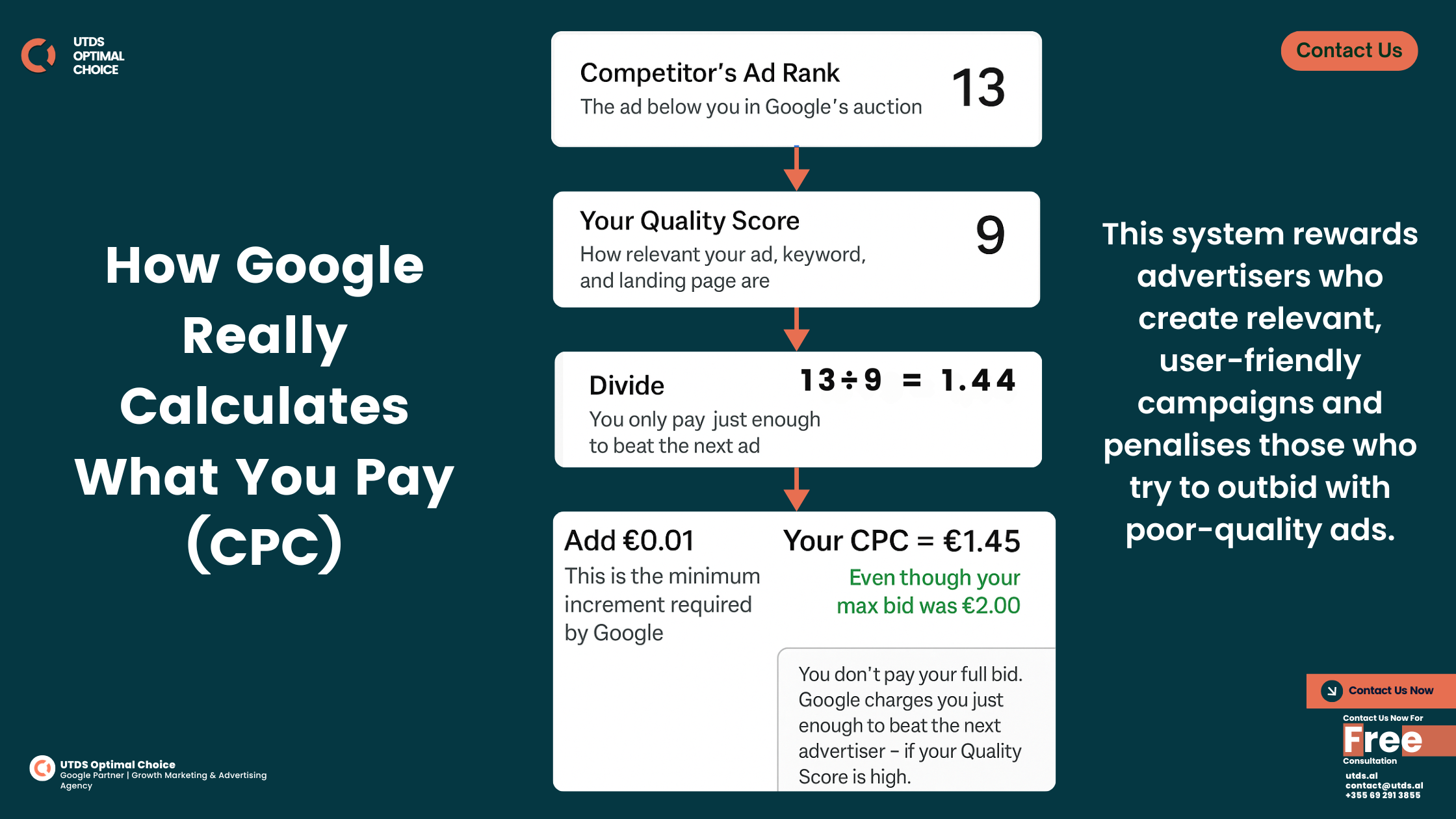
The formula for what you actually pay is:
Your CPC = (Ad Rank of competitor below you ÷ Your Quality Score) + £0.01
So even if your max bid is £2, you might only pay £1.15 depending on competitor rankings.
This system rewards advertisers who create relevant, user-friendly campaigns and penalises those who try to outbid with poor-quality ads.
Additional Variables in Your Google Ads Costs
Even after accounting for Quality Score and Ad Rank, several other factors still influence your Google AdWords pricing. These behind-the-scenes elements can drive your Google PPC cost up or down, depending on how well you manage them.
Landing Page Relevance and Experience
Google tracks what users do after clicking your ad. If your landing page is slow, irrelevant, or hard to navigate, your Quality Score drops, and your cost per click increases.
According to Google’s guidelines on landing page experience, you should:
- Ensure fast page speed (under 3 seconds for mobile)
- Match ad copy to landing page content
- Avoid excessive pop ups or redirects
- Provide a clear CTA and trust signals
In 2025, more UK advertisers are using AMP pages and mobile first layouts to reduce bounce rates and improve Google PPC performance.
Auction-Time Quality
Google uses real-time signals during every auction, such as:
- The exact search query used
- The location and time of the search
- The device being used (mobile, desktop, tablet)
This means even the same keyword can have a different CPC based on when and how the search happens. For instance, searches for “emergency plumber London” at 2am may cost 3x more than during business hours.
Google refers to this as auction-time ad quality, a key variable in fluctuating Google ads cost. (Ref: Google Help Guide Here)
The Device, Location, and Context of Users’ Searches
Device targeting affects performance and cost:
- Mobile searches now account for over 63% of paid clicks in the UK (Exploding Topics, 2025)
- Ads shown to mobile users often have higher CTR but also face increased PPC rates, especially in competitive local niches
Likewise, targeting users in high income postcodes or urban centres like London or Manchester typically increases Google PPC fees.
Alternative Bidding Methods
You’re not limited to manual bidding. Google offers:
- Maximise clicks (great for traffic goals)
- Target CPA (ideal for cost-per-acquisition control)
- Target ROAS (for revenue-driven campaigns)
Choosing the wrong strategy can eat through your budget. For instance, using Maximise clicks for high CPC keywords without controls can burn your entire daily budget in minutes.
Using automated bidding with clear CPA/ROAS targets is now standard among top-performing UK advertisers.
Alternative Ad Formats
Google now offers more than just text ads:
- Responsive search ads (RSAs)
- Call-only ads
- Image extensions
- Performance Max campaigns (covering Search, YouTube, Gmail, Display)
Each format comes with different Google AdWords pay per click dynamics. For example, call only ads in the legal sector often exceed £6 per click, but they convert higher when optimised for mobile.
Tired of Paying More Than You Should for Google Ads? At UTDS Optimal Choice, we help UK businesses control their Google PPC spend by improving everything behind the click, from landing page speed to smart bidding strategies and mobile first ad formats. Let’s audit your current setup and show you where you’re overspending. Book a Free PPC Audit Today. Contact us now
How Does Budgeting Work With Google Ads Costs?
Understanding how Google handles your budget is key to managing your ad spend efficiently. Many UK advertisers mistakenly believe they’re charged a fixed daily amount, but Google Ads budgeting doesn’t work that way. It’s flexible, algorithm-driven, and optimised based on opportunity.
Daily Average Budgets
When setting your budget, you choose a daily average amount for each campaign. For example, if you set £20 per day, Google may spend more or less depending on traffic volume.
Google explains it this way:
“Your daily spend can go up to twice your average daily budget, but you’ll never be charged more than your monthly limit.” – Google Ads Budgeting Guide
So, if your Google ads cost budget is £20/day, your monthly cap is £20 × 30.4 = £608. Google may spend £35 one day, and £15 the next, depending on demand.
This system helps advertisers get more impressions on high-performing days, making your Google PPC costs more efficient.
Spending Limits
Even with budget fluctuations, you’re protected by:
- Monthly spend limit (daily average × days in month)
- Campaign-level caps and custom rules
- Alerts and threshold notifications
Still, many small UK businesses lose money simply because they don’t monitor performance daily or set rules to pause underperforming ads. That’s why partnering with a Google Ads agency UK can be a safer route if you’re new to PPC.
How to Determine Your Average Daily Budget
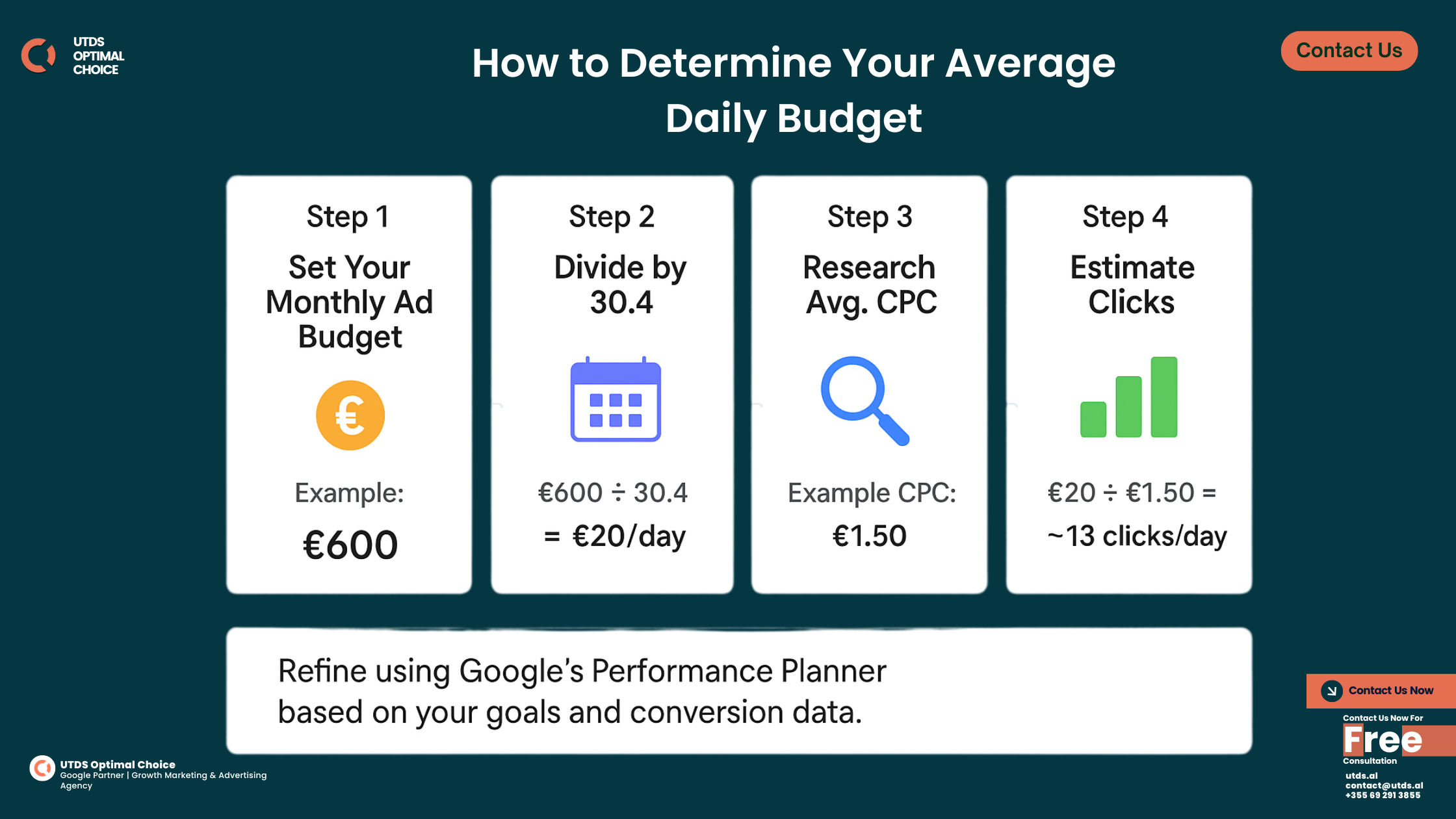
There’s no one-size-fits-all answer, but here’s a basic UK-friendly approach:
- Estimate your desired monthly ad spend (e.g. £600)
- Divide by 30.4 to get your average daily budget (~£20)
- Research cost per click for your keywords (e.g. £1.50)
- Estimate expected traffic = daily budget ÷ CPC (~13 clicks/day)
From there, refine your budget based on conversions and profitability. Use Google’s Keyword Planner and Performance Planner to simulate spend scenarios.
Bidding
Your budget works hand-in-hand with your bidding strategy. The two must align:
- If you want 100 clicks at £2 CPC, you’ll need £200
- If your budget is £100, set a max CPC of £1 or adjust targeting to long-tail keywords with lower Google PPC cost
Smart bidding now dominates UK accounts, but manual CPC is still valuable for tightly controlled campaigns.
What Other Factors Influence My Google Ads Costs?
Beyond keywords and budget settings, there are several tactical choices that directly impact your Google AdWords cost. How, when, and where your ads are shown can significantly change your overall spend and performance.
Dayparting (Ad Scheduling)
Dayparting allows you to choose what time of day your ads appear. This matters because user intent varies throughout the day and so does competition.
- B2B ads perform better during working hours (9am–5pm)
- E-commerce campaigns peak during evenings and weekends
- Emergency services (e.g. locksmiths, plumbers) pay higher Google PPC fees late at night
By avoiding low-converting time slots, you can improve return on ad spend and lower your Google ads cost.
According to Google UK industry data, advertisers using ad scheduling improve conversion rates by up to 23% without increasing cost.
Geotargeting
With geo-targeting, you can focus your ads on specific regions, cities, or even postcodes. This is crucial for UK-based service businesses, especially in sectors like plumbing, removals, or real estate.
Examples:
- Targeting only SW1 and W1 postcodes in London can help premium brands reach high-income customers
- Avoiding regions with low purchasing power can reduce wasted impressions and Google AdWords pricing
Using Google’s location bid adjustments, you can increase bids for high-converting regions and lower them for others.
Device Targeting
Your Google PPC cost also changes based on the device users are searching from. Mobile searches now dominate in most UK sectors, but not all devices perform equally.
- Mobile CPCs are often cheaper but have lower conversion rates for complex services
- Desktop ads usually convert better for B2B, financial, and enterprise products
- Tablet performance is inconsistent, best monitored with performance data
Top advertisers now use device bid adjustments to fine-tune spend and optimise based on where the conversions are actually happening.
According to Data Feed Watch, 2025, UK brands that optimise for device type see 18–32% lower CPCs on average.
How Much Does Google Adwords Cost In 2025
Google Ads Pricing: How Much Does a Typical Click Cost in Google Ads?
The most searched question in 2025 remains: “How much do Google Ads cost?” While the answer varies, there are updated benchmarks to help UK businesses plan smarter.
Key Influence on Pricing in Google Ads: Keywords
Google Ads works on a keyword bidding model, so your Google AdWords cost is largely determined by the keywords you target.
- Generic terms like “plumber” or “life insurance” are expensive
- Long-tail keywords like “emergency plumber South London 24/7” cost less but convert better
- Branded searches often cost significantly less but bring high-converting traffic if you’re well known
This makes keyword research essential to keep Google PPC rates under control.
What Is the Average CPC in Google Ads?
According to Statista UK CPC Benchmarks, the average cost per click on Google in the UK for 2025 is:
- Legal: £5.60
- Finance/Insurance: £4.20
- Healthcare: £2.90
- E-commerce: £1.15
- Technology: £1.40
- Hospitality: £0.98
So, while Google PPC cost starts from under £1, it can go above £6–£8 per click in the most competitive industries.
What Is the Cost-Per-Click for Long-Tail Keywords?
Long-tail keywords, longer, specific search queries, often have:
- Lower CPC (e.g. £0.50–£1.00)
- Higher conversion rates
- Less competition
For instance, instead of targeting “Google Ads agency UK”, bidding on “affordable Google Ads specialist for dentists UK” can reduce your Google PPC fees dramatically.
How Much Do Google Ads Cost in My Industry?
Let’s look at some real-world examples from 2025:
| Industry | Avg CPC (UK) | Conversion Rate | Avg Monthly Budget |
|---|---|---|---|
| Legal | £5.60 | 6.98% | £2,000–£6,000 |
| Finance | £4.20 | 8.34% | £3,000–£7,500 |
| SaaS | £1.80 | 5.20% | £1,500–£4,000 |
| E-commerce | £1.15 | 3.70% | £500–£3,000 |
| Local Services | £0.90–£1.40 | 7.10% | £300–£2,000 |
Source: WordStream 2025 PPC Benchmarks
What Are the Most Expensive Keywords in Google Ads?
As of 2025, some of the highest Google AdWords pay per click keywords in the UK include:
- “Insurance claims solicitors”: £7.50
- “Injury lawyer London”: £6.80
- “Business loans UK”: £6.40
- “Emergency boiler repair London”: £5.20
These terms remain costly due to high competition and large profit margins. The costs may vary time to time and demand.
Resources:
How Can I Reduce the Cost of Google Ads?
You can lower your Google Ads cost by:
- Improving Quality Score
- Targeting long-tail and low-competition keywords
- Using location and device bid adjustments
- Running A/B tests for ad copy and landing pages
- Managing negative keywords actively
- Switching to Target CPA or ROAS bidding
Working with a specialist Google Ads agency UK can also help uncover hidden opportunities to trim fat and stretch your ad budget.
You don’t need to spend more to get better results, you just need smarter strategy. At UTDS Optimal Choice, we help UK businesses reduce their Google Ads cost through data-led targeting, cleaner account structures, and real-time optimisation. Want a Free PPC Cost Audit? Contact us now
How Much Do Typical Businesses Spend on Google Ads?
Knowing the cost per click is helpful, but many UK business owners still ask: “How much should I actually spend on Google Ads each month?”
The answer depends on your industry, location, goals, and how competitive your keywords are, but there are clear patterns across sectors in 2025.
How Much Do Small Businesses Spend On Google Ads?
According to data from LocaliQ UK, most small businesses in the UK spend between £300 and £1,500 per month on Google Ads.
Here’s how that typically breaks down:
| Business Type | Avg Monthly Budget | Avg CPC | Est. Clicks/Month |
|---|---|---|---|
| Local Service (e.g. plumber, dentist) | £500–£1,200 | £1.00–£2.00 | 250–600 clicks |
| Small E-commerce Store | £400–£900 | £0.80–£1.50 | 300–750 clicks |
| Freelancers & Consultants | £300–£700 | £1.50–£2.50 | 120–300 clicks |
Most small businesses aim to generate at least 3–5 leads per day, so they base spend on what it costs to bring in those leads profitably.
A good return on ad spend (ROAS) target for most local UK businesses is 3:1 or higher meaning £300 in ad spend should bring in at least £900 in revenue.
What About Medium To Large UK Businesses?
Larger companies running national or multi-location campaigns spend more, often between £3,000 and £10,000+ per month depending on:
- Number of active campaigns
- Number of products or services promoted
- Need for remarketing or display ads
- Use of YouTube and Performance Max campaigns
B2B companies, in particular, may run high-CPC campaigns but justify the cost based on a high customer lifetime value. For example:
- A B2B SaaS firm spending £5,000/month may only need 10 conversions if each deal is worth £1,000+ MRR
- A mortgage broker paying £6 CPC may still profit if each lead closes at a 10% rate with a £1,500 commission
Ad Spend vs Agency Fees
Many UK businesses work with a Google Ads agency, which typically charges:
- £300–£900/month for small campaigns
- 10–15% of ad spend for medium/large accounts
- Some also charge setup or performance fees
While this is an added cost, a well-run account can halve your CPC over time and significantly improve conversion tracking and return.
What Other Costs Are Involved In Google Ads?
When calculating your total Google Ads cost, it’s not just about how much you pay per click. There are other expenses and operational costs that can impact your final ROI, especially if you’re managing multiple campaigns or working with professionals.
Agency Costs
If you’re working with a Google Ads agency UK, you’ll typically pay one of the following:
- Flat monthly retainer: £300–£1,500 per month for SMEs
- Percentage of ad spend: Commonly 10–15% of your total ad budget
- Performance-based pricing: Some agencies charge based on conversions, leads, or sales generated
- One-time setup fees: For new campaigns or full account rebuilds (ranges from £200 to £1,000+)
While this adds to your overall Google AdWords pricing, many businesses save more in wasted spend than they pay in fees, especially if the agency is managing things like bidding strategy, keyword targeting, and conversion tracking.
According to Clutch UK’s agency cost survey, businesses that partner with a PPC agency are 28% more likely to see profitable ROI within the first 3 months.
Creative and Asset Production
You may also incur costs for:
- Landing page design (especially for Performance Max or lead generation)
- Banner ad creatives for Display Network
- Copywriting for high-converting ad headlines and descriptions
- Video production (if you use YouTube Ads)
While not mandatory, these assets can significantly boost click-through rates, Quality Score, and ultimately lower your Google PPC cost over time.
Analytics and Conversion Tracking Tools
To measure performance accurately, businesses often pay for:
- Heat mapping tools (e.g. Hotjar, Crazy Egg)
- Call tracking (e.g. CallRail)
- Google Analytics 4 configuration (especially for multi-step conversions)
- CRM or lead tracking integration (HubSpot, Zoho, Pipedrive)
These tools improve attribution and campaign performance, but they also add an extra £50–£300/month, depending on the stack.
How Much Do Google Ads Cost? Key Takeaways
By now, it’s clear there’s no single answer to how much Google Ads cost in 2025, but we can summarise the key points:
- Average CPC in the UK ranges from £0.60 to £6+, depending on your industry, keywords, and targeting
- Small businesses typically spend £300–£1,500/month, while medium-sized firms often spend £3,000–£10,000+
- Your Google AdWords pricing is influenced by:
- Quality Score and Ad Rank
- Keyword competition
- Targeting options (device, location, time)
- Account structure and landing page quality
- Long-tail keywords and well-managed campaigns can cut your Google PPC fees by 40–60%
- Additional costs (agency, creatives, analytics tools) should be factored into your total ad budget
There’s no “set price” but there is a smart price range for every business. The trick is making sure your spend actually converts.
Is the Google Ads Price Right for You?
Google Ads isn’t cheap, but done right, it’s not expensive either.
If you run a service business in Sheffield or a product shop in London, and you’re getting targeted clicks at £1.50 that convert into £250 jobs or £100 orders, then your Google Ads cost is well justified. The key is efficiency over volume.
What matters most is:
- Are you tracking conversions properly?
- Are you targeting the right audience?
- Is your landing page convincing people to buy or contact you?
If not, every pound you spend is wasted and Google will happily keep charging you. That’s why many UK businesses now work with a Google Ads agency to make sure their ad budget delivers.
Need Help Reducing Your Google Ads Cost?
At UTDS Optimal Choice, we help UK businesses lower their Google Ads costs while increasing performance. Whether you’re spending £500/month or scaling to £10K+, our team will:
- Audit your existing account
- Identify wasted spend
- Improve keyword targeting and Quality Score
- Build high-converting landing pages
- Set up clear analytics and ROI tracking
Let’s help your ads work smarter not harder. Speak to our Google Ads Specialist Now

